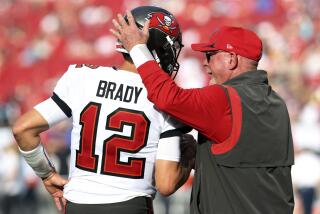Team Is Ticketed for Big Things
- Share via
TAMPA, Fla. — In their 23rd season, the makeover of the Tampa Bay Buccaneers appears complete. They have replaced chaos with continuity, futility with success, and now, even long-standing apathy with renewed passion.
This summer, for the first time in his stewardship, general manager Rich McKay was confronted with a crisis of ticket availability and a throng of disgruntled fans. There wasn’t nearly enough ticket supply to meet fan demand when the club sold out its first four home games in record time in early August.
“That’s a good problem to have,” said McKay. “I’ve been in the other place. Tickets and expectations are very nice problems to have.”
It helps that the Buccaneers will open a gorgeous new 66,000-seat stadium next month. But this new-found crush for Buccaneers tickets can be attributed more accurately to the team’s swift ascent from perennial doormat to Super Bowl contender.
While the transformation seems to have occurred overnight with the arrival in 1996 of coach Tony Dungy, it actually took root in 1994 when the Buccaneers made Trent Dilfer the sixth pick of the draft and the quarterback of an uncertain future.
Four years later, Dilfer is the cog upon which the 1998 season will turn. Such is his cast of complementary parts that if he can hit receivers Bert Emanuel and Reidel Anthony often enough down field, the once woebegone Buccaneers can challenge for the NFC championship.
More specifically, if Dilfer’s passing game can chase the Green Bay Packers out of their eight-man fronts geared to stop Tampa Bay’s running game, the Buccaneers can finally beat the Packers after five consecutive losses.
“We need to make more plays in the passing game,” Dilfer says when asked what it will take to topple the Packers. “Not necessarily a higher percentage or more yards, but we need to hit more third-and-10’s for touchdowns. We need to capitalize on big plays, we need to be more opportunistic.”
That is how far these Buccaneers have come. They have one of the NFL’s most intimidating defenses, led by Pro Bowl tackle Warren Sapp. They have one of the most productive running games with Warrick Dunn and Mike Alstott. They have one of the best coaches in Dungy, and one of the most creative general managers in McKay.
They just need a viable passing game from Dilfer, whose franchise-record 21 touchdown throws last year were somewhat misleading. “Trent was proficient on third down,” McKay said. “But we didn’t make very many big plays. By the end of the year, people did not treat the pass as much of a threat.”
Even so, the Buccaneers tied a franchise-record with 11 wins last season, reached the playoffs for the first time in 15 years and won a postseason game for the first time in 18 years. In January, they lost their divisional playoff game to the Packers, 21-7.
The Buccaneers arrived at this juncture largely through McKay’s draft-day deals and Dungy’s hand at developing one of the league’s youngest teams.
Since McKay was appointed general manager of the team in November 1994, the Princeton graduate proved adept at draft-day wheeling and dealing. He positioned the Buccaneers with a league-high six first-round selections his first three drafts, netting a total of nine starters.
This year, McKay traded his lone first-round pick for a pair of second-rounders and used them on wide receiver Jacquez Green of Florida and cornerback Brian Kelly of USC, two positions of need.
The trade-down has become a staple of McKay’s draft tactics. Three times in four years he’s done it and come away with the players he wanted, starting in 1995 when he wound up with Sapp and linebacker Derrick Brooks.
Sapp, projected as a top-three pick that year, plummeted when reports surfaced of failed drug tests. The Buccaneers traded down from the seventh to the 12th pick and snagged him, even though speculation had them taking defensive end Mike Mamula.
The trade-down was big again in 1997 when the Buccaneers dropped from the eighth pick to the 12th and snared Dunn, an elusive scatback runner who was the NFL’s offensive rookie of the year.
Dungy’s input has given the Buccaneers a sharper focus. The new regime wanted to tap production, not promise, in the draft. That and high-character players became the keynote.
More to Read
Go beyond the scoreboard
Get the latest on L.A.'s teams in the daily Sports Report newsletter.
You may occasionally receive promotional content from the Los Angeles Times.









